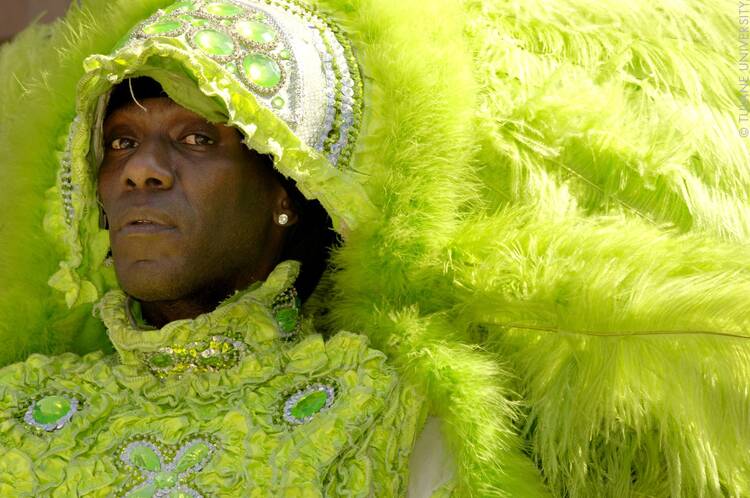When you think Mardi Gras, you might think king cake, colorful beads thrown from parades, and as much debauchery as one can manage before the Lenten season of repentance begins the following day. Maybe you’ve wondered whether Mardi Gras, or Fat Tuesday, is even a Catholic holiday given the day’s deluge of decadence.
Mardi Gras is not only Catholic, it’s French, Creole, African-American, African and Native American. And there are layers to this ornate carnival that reveal a powerful history of Black joy, resistance and rebellion. So tells Nekisha Elise Williams, the author of Mardi Gras Indians, and today’s guest on The Gloria Purvis Podcast.
“There are really two Mardi Gras,” says Nekisha, “and where Black people party and have Mardi Gras is not always the same as where white people party and have Mardi Gras.” For a long time, the segregation between white and Black Mardi Gras was policed by Jim Crow laws. And while there is growing curiosity about what happens at “Black Mardi Gras,” Nekisha says the impact of white supremacy culture still reinforces this historical segregation.
One vibrant and distinct tradition that white mainstream Mardi Gras often misses is that of the Mardi Gras Indians, otherwise known as the Black-Masking Indians. They have a fascinating history that dates back to the 1800s, when Native Americans provided a safe refuge for enslaved Africans who had escaped bondage. This friendship between formerly enslaved Africans and various Native American tribes of the lower Mississippi River Valley helped birth one of the most colorful and unique cultural expressions of Mardi Gras.
Nikesha has done extensive research on the Mardi Gras Indians and describes them as “a group of men, women, children, families, neighbors who at Carnival time in New Orleans mask Indian or mask as the Plains Indians, Native American indigenous people.”
Masking as indigenous has served at least two important purposes. It’s a way to pay homage to their ancestors and their friendship with the Native American tribes that harbored them “while also paying tribute to the warrior culture of African tribes that were enslaved on the continent and brought over to the new world,” says Nikesha.
“It's not just a parade [...] to go out, get drunk, have fun, and like say, ‘Hey, Mister, throw me some beads,’” Nikesha says. “For some of them, it really is a spiritual and religious experience. And that goes down to the songs that they sing, the hand signals that they throw, the dances that they do, and how they operate within their communities as well.”
To learn more about the colorful and defiant history of the Mardi Gras Indians, be sure to listen to this special Mardi Gras episode of The Gloria Purvis Podcast.
To support this podcast, please consider getting a digital subscription to America Media at www.americamagazine.org/subscribe.








